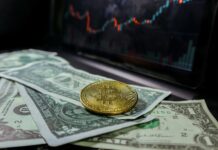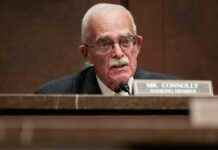People were glued to the screen as Berkshire Hathaway chairman Warren Buffett made a shocking announcement at the company’s annual shareholders’ meeting in Omaha, Nebraska on May 3, 2025. The news of his decision to step down after a remarkable 60-year tenure sent ripples through the investment community, causing Berkshire Hathaway shares to plummet on Monday.
At the ripe age of 94, Buffett surprised everyone by revealing that Greg Abel, the vice chairman of noninsurance operations, would be taking over as CEO. The board unanimously voted for Abel to assume the role of president and CEO starting on January 1, 2026, while Buffett would remain as chairman. This unexpected change in leadership shook the market, causing Berkshire Class A shares to drop by 3.7% to around $779,634, following a record high of $809,350 per share. Similarly, Class B shares took a hit, falling to $519.99 after reaching an all-time high of $539.80 just a day before. The Class B shares were originally issued in 1996 at a price equivalent to one-thirtieth of a Class A share and underwent a 50-for-1 split in 2010.
Despite the initial shock, shareholders were encouraged to see a smooth transition plan in place. Macrae Sykes, a portfolio manager at Gabelli Funds and a Berkshire shareholder, expressed confidence in the decision, stating, “Shareholders should welcome this transparent transition, but also have confidence that Warren isn’t going anywhere.” Sykes emphasized the importance of Buffett’s continued presence as Chairman to mentor Abel and the rest of the Berkshire leadership team, especially when it comes to major capital allocation decisions in the future.
This leadership change marks the end of an era for Berkshire Hathaway, a company that has evolved from a struggling textile mill in New England to a diversified conglomerate valued at nearly $1.2 trillion under Buffett’s guidance. The company’s portfolio now includes businesses in insurance, railroad, retail, manufacturing, and energy sectors. Buffett’s departure comes at a time when Berkshire shares had just reached a new peak, reflecting his successful stewardship of the company.
Brian Meredith, UBS’ Berkshire analyst, noted that Buffett leaves behind a company that is less dependent on his investing prowess, with a strong lineup of businesses generating robust cash flows. Despite the change in leadership, Meredith predicted minimal operational changes at Berkshire under Abel’s leadership, with the company’s culture and strategy expected to remain intact.
The market reaction to Buffett’s announcement may also have been influenced by Berkshire’s first-quarter results, which showed a 14% decline in operating earnings primarily due to a significant drop in insurance underwriting profit. The company attributed a $1.1 billion loss during the period to the Southern California wildfires.
Despite these challenges, Berkshire shares have outperformed the S&P 500, posting a nearly 19% increase in value this year. Investors have been drawn to Berkshire Hathaway as a relatively safe investment option, thanks to its massive insurance business and strong balance sheet.
In conclusion, Warren Buffett’s decision to step down as CEO of Berkshire Hathaway has sparked a mix of emotions in the market. While some investors may be wary of the change in leadership, others see it as a natural progression for the company. As Berkshire enters this new chapter, all eyes will be on Greg Abel as he takes the reins from a legendary figure in the world of investing.

























